Garuḍa, the great bird-carrier of Lord Viṣṇu
[The following excerpt was taken from notes written during Śrīla Bhaktivedānta Nārāyaṇa Mahārāja’s talk, spoken partly in English and partly in Hindi in Auckland, New Zealand on January 12, 2001. A close relative of the devotee hosting Śrīla Bhaktivedānta Nārāyaṇa Mahārāja came for darśana. Śrīla Bhaktivedānta Nārāyaṇa Mahārāja joked with him and told him not to come to his darśanas or classes because he would then give up his home and family, and take sannyāsa. Then he said:]
Once, there was an argument between the co-wives of Kaśyapa Muni. Their names were Kadrū and Vinatā. Vinatā said, “The sun has a human form. That sun-god sits on a chariot and that chariot is pulled by white horses with shining white tails.” The queens were at that time not seeing the chariot clearly. Kadrū knew that the horses’ tails were white, but just to be contradictory she said they were black. Kadrū told Vinatā “If I am right, then you will have to become my maidservant, and if you are right, then I’ll become your maidservant.” The two co-wives then arranged to see the chariot better, when the sun would be more clearly visible.
Kadrū was the mother of snakes. She told her sons, who were black cobras, “I do not want to be a maidservant. Go to the horses before sunrise, and cover their tails with your bodies so that I do not lose.” Her sons flew into the sky and covered the tails. When Kadrū and Vinatā later saw the horses, the tails were black, and Vinatā was bound to become the maidservant of Kadrū.
At that time Vinatā was pregnant and she later gave birth to Garuḍa. When he was somewhat grown, Garuḍa realized that his mother was a maidservant, and he wept. He inquired from her how she had become so, and asked if there was a way for her to be freed. Vinatā told her son how she had lost a bet, and her freedom would come only if she would give Kadrū a kalasa, a jar, of heavenly nectar.
That nectar was kept by Indra in Svargaloka, heaven, under lock and key. Garuḍa easily flew to Svarga and defeated the demigods. Taking the pot of nectar he returned to his home and gave it to his mother, who was then freed. On the way home he had stopped in four places to rest — Vṛndāvana, Prayāga, Haridvāra, and Ujjain. When he sat at each of these places, the air there was touched by the nectar, and some nectar also seeped through the clay pot. One of those places was Vṛndāvana. That is why, when the Kālīya serpent ‘killed’ everyone in Vṛndāvana by his poison, one tree remained alive — the tree upon which Garuḍa had sat.
But what is the real nectar? Garuḍa is an eternal servant of Lord Nārāyaṇa. His heart is a pot of nectar because 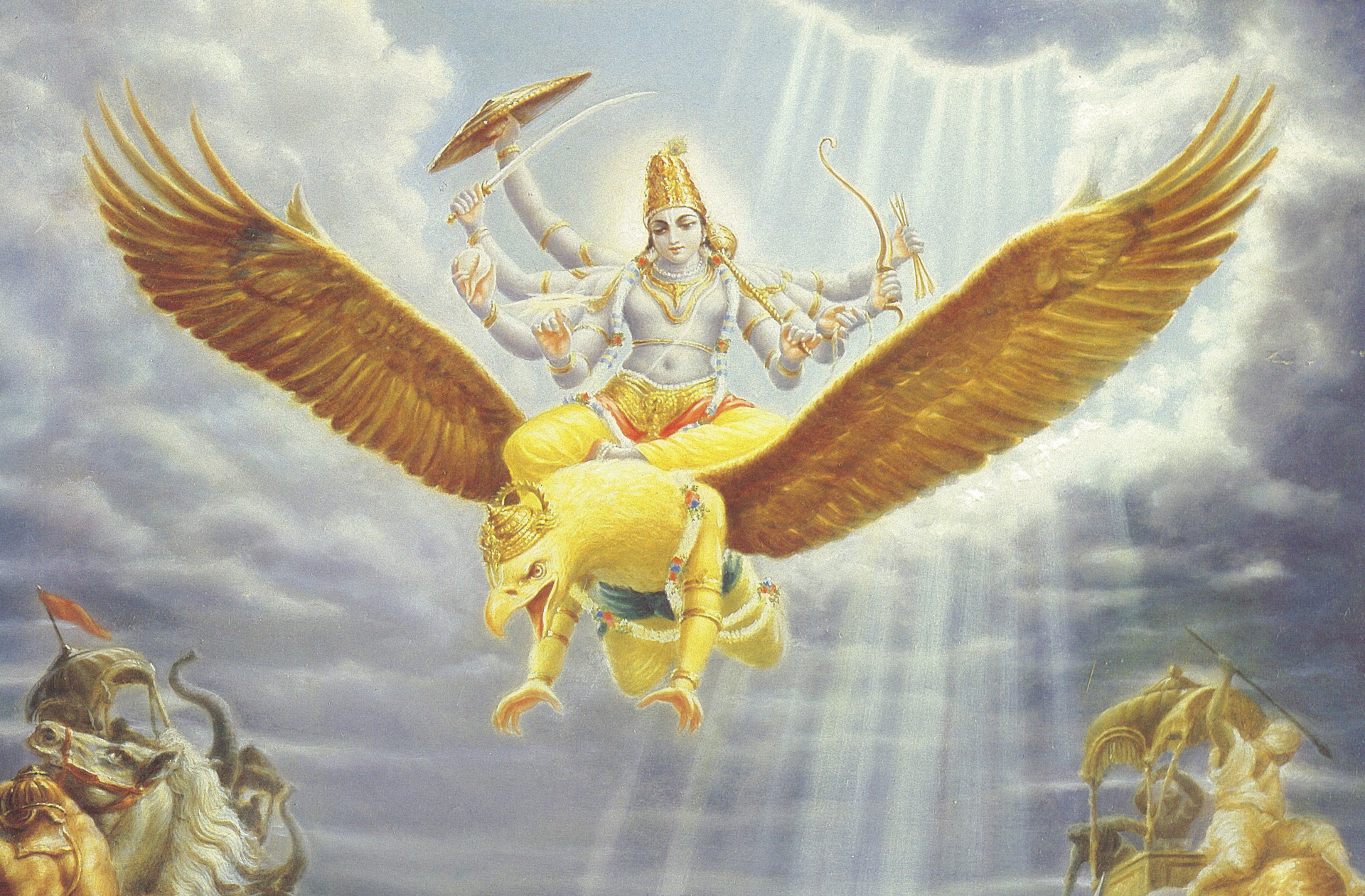 he keeps the pastimes of Nārāyaṇa there. Thus, when he sat at those places he spoke hari-kathā to the sages assembled there, like Nārada and the four Kumāras. This is nectar.
he keeps the pastimes of Nārāyaṇa there. Thus, when he sat at those places he spoke hari-kathā to the sages assembled there, like Nārada and the four Kumāras. This is nectar.
Nowadays pilgrims only go to the Ganges to take a bath, and if she is merciful, in thousands of years she may give some purity. On the other hand, sādhu-saṅga will give immediate results. By the association of Svarga your lust, problems, and pride will be increased, and you’ll be lost in false ego. However, by a high class of association, hari-kathā can give even the association of Rādhā-Kṛṣṇa Conjugal. We cannot calculate how high this is.
It is said in śāstra that you will be liberated by taking a bath in Kumbha-melā, but this is said just to attract general people so that they may meet sādhus like Nārada Muni. Moreover, I know that what I’m telling you, you will not hear from any other sādhu.
One of the places at which Garuḍa dropped nectar was Prayāga. Every twelve years, during a certain constellation, many sādhus come there and hold a melā, festival, giving talks about spiritual subjects. The Sanskrit word for clay pot is kumbha, and therefore the melā is called Kumbha-melā. The fruits of taking a bath at Kumbha-melā cannot be compared to an atom of the benefit achieved by being in Vṛndāvana.
The following is an excerpt from Śrīmad Bhagavad-gītā, Fourth Edition, Chapter 6, Verses 20-25, Translation into Hindi and commentary by Śrīla Bhaktivedānta Nārāyaṇa Mahārāja
In this regard, Śrī Gauḍapāda, Śaṅkarācārya’s parama-gurudeva, has given the example of vowing to dry up the ocean by taking out a drop at a time with the tip of a piece of kuśa grass. Similarly, by untiring, determined endeavour, a person can control the mind.
There is a story to exemplify this. Once a bird laid her eggs on the shore of an ocean, but the waves carried the eggs away. The bird resolved to dry up the ocean, and with her beak she began to remove water, drop by drop. Other birds came to convince her that her endeavour was futile, but she was not deterred. By chance, Śrī Nārada came to that place and he also tried to convince the bird to stop, but the bird took a vow in his presence: “I will not rest until I dry up the ocean, whether it is in this life or in the next.” Merciful Nārada then sent Garuḍa to help her. When Garuḍa heard that the ocean had carried away the eggs of someone in his own caste, he began to dry up the ocean by fanning it with his wings. The terrified ocean immediately returned the eggs to the bird.
Similarly, it is certain that when a person begins the process of yoga, jñāna or bhakti with faith in such scriptural statements, Śrī Bhagavān will definitely bless his enthusiastic endeavour.
In the two verses beginning with the word saṅkalpa, Śrī Bhagavān is explaining the initial and ultimate activities of a person engaged in such yoga. Abandoning all material desires (Gītā 6.24) is the initial act, and not worrying about anything at all, as spoken in the Gītā (6.25), is the final act.
Excerpt from the book Svarūpa of the Jīva, Our Original Spiritual Identity, A Treasury of Wisdom from Prominent Gauḍīya Vaiṣṇava Ācāryas, First edition
Balarāma’s sakhya-rasa is mixed with dāsya and vātsalya-rasa. Yudhiṣṭhira’s vātsalya is mixed with dāsya and sakhya. Ugrasena and others have dāsya, mixed with some vātsalya. Aged gopīs have vātsalya mixed with sakhya. Nakula, Sahadeva, Nārada, and others have sakhya mixed with prīti (dāsya). Śiva, Garuḍa, Uddhava, and others have prīti (dāsya) mixed with sakhya-rasa.
Excerpt from the book Encounters With Divinity by Śrīla Bhakti Rakṣaka Śrīdhara Mahārāja (www.gosai.com/writings/encounters-with-divinity), a darśana with Śrīla Bhakti Rakṣaka Śrīdhara Mahārāja on May 1-3,1982 in India (Gvssanga.com/ssm-transcripts)
Hanumān had his unchangeable heart in the service of dāsya-rasa. Wherever the consideration of dāsya-rasa 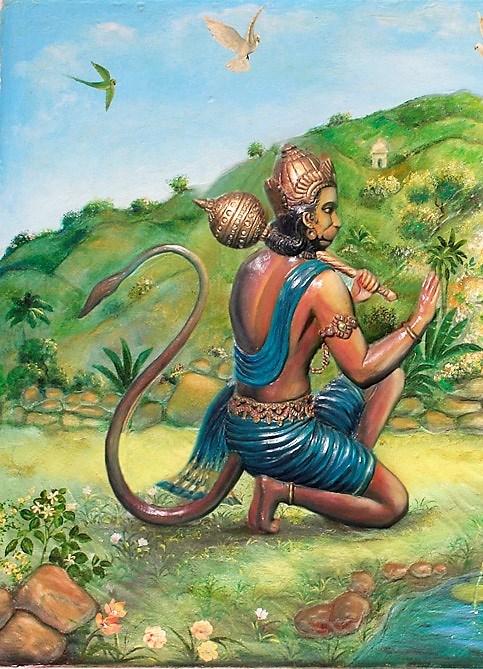 comes in, then Hanumān is represented as the ideal servant. Of course, his particular service is so famous that sometimes his superiority is supported by some special consideration which cannot be accommodated in the ordinary science of devotion. Garuḍa is considered to be the servant of Kṛṣṇa and Kṛṣṇa is considered to hold a higher position than Rāmacandra. So Garuḍa must be considered higher in dāsya-rasa—but it is seen that Garuḍa is defeated at the hands of Hanumān several times.
comes in, then Hanumān is represented as the ideal servant. Of course, his particular service is so famous that sometimes his superiority is supported by some special consideration which cannot be accommodated in the ordinary science of devotion. Garuḍa is considered to be the servant of Kṛṣṇa and Kṛṣṇa is considered to hold a higher position than Rāmacandra. So Garuḍa must be considered higher in dāsya-rasa—but it is seen that Garuḍa is defeated at the hands of Hanumān several times.
Once, Garuḍa had the advantage over Hanumān when Rāma and Lakṣmaṇa were at war with Rāvaṇa. Rāma and Lakṣmaṇa were both tied up with snakes. Then Brahmā intimated to them to think about Garuḍa. Garuḍa came, and as he approached, all the snakes fled away. Rāmacandra was satisfied, propitiated by Garuḍa’s service, and asked him to ask for a benediction. Garuḍa asked, “I know that You are my Master, Kṛṣṇa, Nārāyaṇa, but You are now in another form, where Hanumān is Your exclusive servant. But if You are satisfied with my service in the least, I pray that You please show the figure of my own beloved Lord Kṛṣṇa.”
Then Rāmacandra said, “Hanumān is there and won’t be able to tolerate such a thing.” Garuḍa said, “That does  not matter, I shall manage.” So, Garuḍa, with his wings, created a temporary shelter and there Rāmacandra showed His form of Kṛṣṇa to Garuḍa. Of course, Hanumān could understand what was happening, and he promised, “I shall take revenge when my Lord Rāma comes as Kṛṣṇa.”
not matter, I shall manage.” So, Garuḍa, with his wings, created a temporary shelter and there Rāmacandra showed His form of Kṛṣṇa to Garuḍa. Of course, Hanumān could understand what was happening, and he promised, “I shall take revenge when my Lord Rāma comes as Kṛṣṇa.”
Later, in Dvāpara-yuga, Garuḍa was asked by Kṛṣṇa to collect one hundred and eight blue lotuses, and Garuḍa went to collect them from a lake which is close to Hanumān’s residence. Hanumān knew that Garuḍa was coming, so he sat there on the path like an old small monkey. Garuḍa wanted to pass, but it is not good etiquette to step over another living being, so Garuḍa asked the monkey, “Get out of my path. I don’t want to jump over you. Please move off the path.”
But Hanumān had a motive and said, “I am an old monkey. I have no power to move my limbs. Please take some other path or move me from this path. I can’t move. I am too old and I don’t feel well.”
Then Garuḍa again requested with some urgency, “No, no, you don’t know who I am. Move! Clear the way, otherwise I shall have to teach you a lesson.”
“What can I do? I am infirm, I can’t move my limbs. So, don’t be angry with me, what can I do?” Then Garuḍa threatened him again, but the same answer came.
“What am I to do with him?” He thought. “I shall have to move him from the path.”
“Yes,” said Hanumān, “You may do so if you wish.”
Garuḍa said, “I won’t touch you. By the fluttering of my wings I shall move you far away.”
“Yes,” said Hanumān, “You may do so if you like.”
Then Garuḍa began to flap his wings with the kind of jet power that the British used to attack the Falkland Islands. Garuḍa began to flutter his wings and saw, “What is this? The fluttering of my wings can remove so many trees, but this small monkey can’t be moved. What’s the matter?” And then he saw, that what to speak of moving his body, not even the hairs on his body were moving. Then with all his force he caught Hanumān with his beak, but that also failed.
Then Garuḍa could do no more, and Hanumān rose and caught hold of him and put him under his armpit.
“No, no, I have come to collect blue lotuses for my Lord. Who are you? Why are you disturbing me in this way?”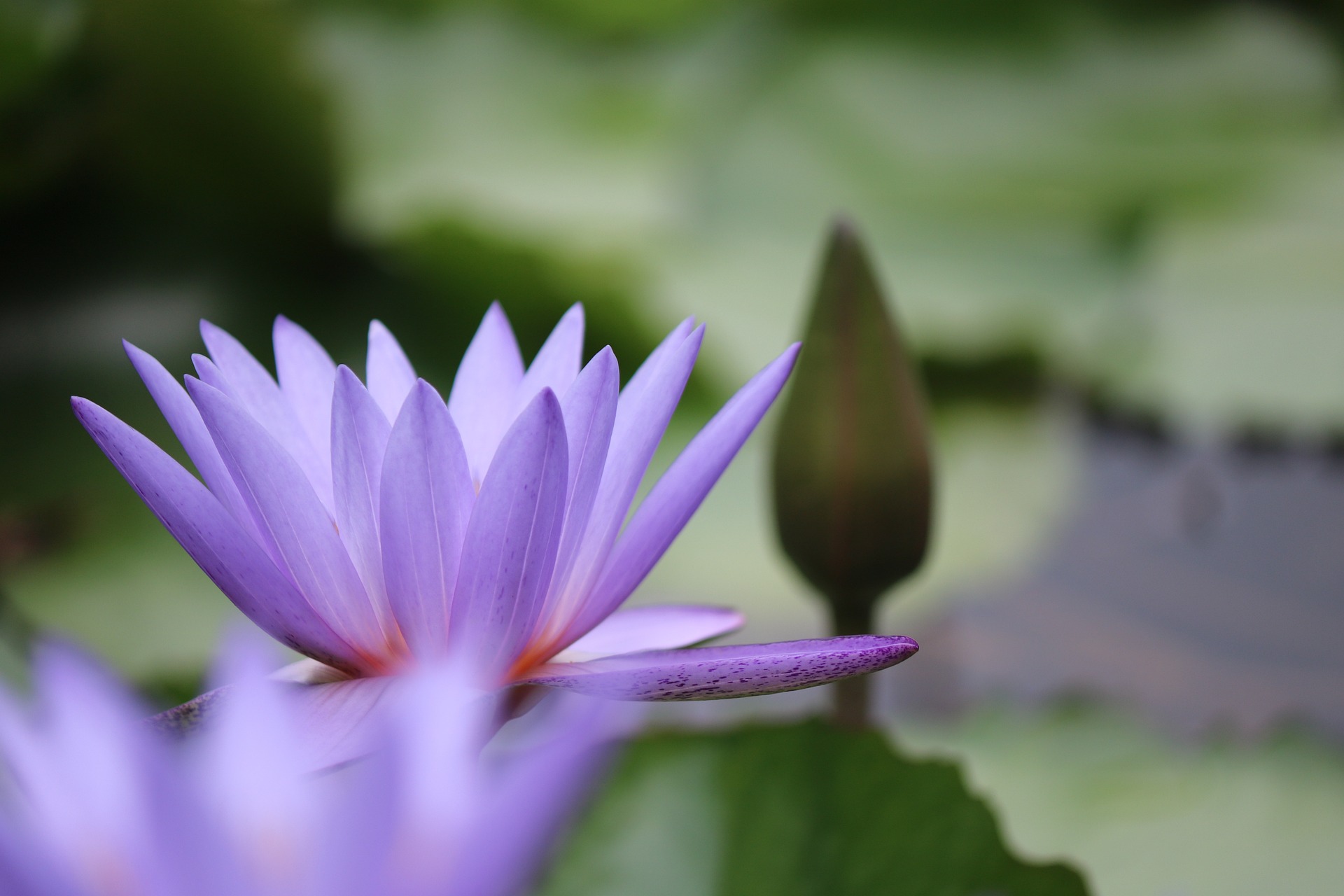
Hanumān said, “Don’t worry about the blue lotuses. I can manage.” Keeping Garuḍa under his armpit, Hanumān took the blue lotuses and began to head towards Dvārakā.
Kṛṣṇa knows everything. He knew these things would happen. He was staying in Dvārakā at the time, and Rukmiṇī and Satyabhāmā were present with Him. As Hanumān approached the gates of Dvārakā, Kṛṣṇa began discussing Hanumān’s devotion to Rāma with Rukmiṇī and Satyabhāmā.
When Hanumān reached Dvārakā, he found the Sudarśana cakra guarding the gate. Hanumān approached the gate chanting, “Jaya Rāma, Jaya Rāma, Sītā-rāma, Jaya Rāma.” In the meantime, Kṛṣṇa told Satyabhāmā, “My devotee Hanumān is approaching. Since he worships Sītā and Rāma, I will take the form of Rāmacandra and you take the form of Sītā.” Satyabhāmā could not take the role of any other consort, so, Kṛṣṇa said, “If you can’t do it, then I shall ask Rukmiṇī.” Then Rukmiṇī came forward and took the form of Sītā. Then they considered, “Hanumān is almost here! What about Satyabhāmā?” Kṛṣṇa turned to Satyabhāmā and said, “You go and hide under the throne.”
The Sudarśana cakra was revolving near the gate as a watchman. Hanumān was chanting, “Jaya Rāma, Jaya 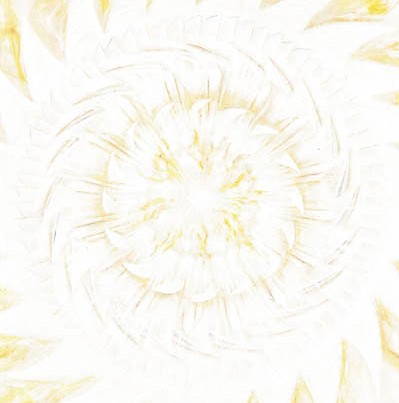 Rāma.” The Sudarśana cakra told him, “There is no Rāma here! Where are you going, monkey?” Hanumān said, “No, no, my Rāma is here, you do not understand.” Sudarśana said, “No! I cannot allow you to enter.” Then Hanumān just extended his finger within the centre of the Sudarśana cakra and suddenly made it so big that the cakra lost its twirling movement and became a tight ring on the finger of Hanumān.
Rāma.” The Sudarśana cakra told him, “There is no Rāma here! Where are you going, monkey?” Hanumān said, “No, no, my Rāma is here, you do not understand.” Sudarśana said, “No! I cannot allow you to enter.” Then Hanumān just extended his finger within the centre of the Sudarśana cakra and suddenly made it so big that the cakra lost its twirling movement and became a tight ring on the finger of Hanumān.
And so Hanumān entered Dvārakā, with Garuḍa under his armpit, the blue lotuses in his hand, and the Sudarśana cakra on his finger. When he entered the palace where Kṛṣṇa was, he saw Rukmiṇī as Sītā and Kṛṣṇa as Rāma. Hanumān thought, “My Lord is here!” He began to offer those blue lotuses to the holy feet of Rāmacandra, while chanting “Sītā-Rāma, Sītā-Rāma!” Then after that, he began asking, “My Lord, who is that moving under the throne? What is this?”
“No, no,” said Kṛṣṇa. “You need not mind that.”
Garuḍa, the Sudarśana cakra, and Satyabhāmā had some conceit, some sort of pride in their mind in their respective zones, and it was the will of Kṛṣṇa to give some check to these three.
And in this way, with the help of Hanumān, Kṛṣṇa managed to check their pride. Kṛṣṇa has a higher position than Rāmacandra, but His attendants met some dishonour at the hands of Hanumān. So Hanumān’s dāsya-rasa, his mellow of servitude, is very intensified and famous.
The following is an excerpt from Kṛṣṇa, the Supreme Personality of Godhead, Chapter 17, by Śrīla Bhaktivedānta Svāmī Mahārāja Prabhupāda
King Parīkṣit, after hearing of the chastisement of Kāliya, inquired from Śukadeva Gosvāmī as to why Kāliya left his beautiful land and why Garuḍa was so antagonistic to him. Śukadeva Gosvāmī informed the king that the island known as Nāgālaya was inhabited by serpents and that Kāliya was one of the chief serpents there. Being accustomed to eating snakes, Garuḍa used to come to this island and kill many serpents at will. Some of them he actually ate, but some were unnecessarily killed. The reptile society became so disturbed that their leader, Vāsuki, appealed to Lord Brahmā for protection. Lord Brahmā made an arrangement by which Garuḍa would not create a disturbance: on each half-moon day, the reptile community would offer a serpent to Garuḍa. The serpent was to be kept underneath a tree as a sacrificial offering to Garuḍa. Garuḍa was satisfied with this offering, and therefore he did not disturb any other serpents.
But gradually, Kāliya took advantage of this situation. He was unnecessarily puffed up by the volume of his accumulated poison, as well as by his material power, and he thought, “Why should Garuḍa be offered this sacrifice?” He then ceased offering any sacrifice; instead, he himself ate the offering intended for Garuḍa. When Garuḍa, the great devotee-carrier of Viṣṇu, understood that Kāliya was eating the offered sacrifices, he became very angry and rushed to the island to kill the offensive serpent. Kāliya tried to fight Garuḍa and faced him with his many hoods and poisonous sharp teeth. Kāliya attempted to bite him, and Garuḍa, the son of Tārkṣya, in great anger and with the great force befitting the carrier of Lord Viṣṇu, struck the body of Kāliya with his effulgent  golden wings. Kāliya, who is also known as Kadrūsuta, son of Kadrū, immediately fled to the lake known as Kāliya-hrada, which lay within the Yamunā River and which Garuḍa could not approach.
golden wings. Kāliya, who is also known as Kadrūsuta, son of Kadrū, immediately fled to the lake known as Kāliya-hrada, which lay within the Yamunā River and which Garuḍa could not approach.
Kāliya took shelter within the water of the Yamunā for the following reason. Just as Garuḍa went to the island of the Kāliya snake, he also used to go to the Yamunā to catch fish to eat. There was, however, a great yogī known as Saubhari Muni who used to meditate within the water there and who was sympathetic with the fish. He asked Garuḍa not to come there and disturb the fish. Although Garuḍa was not under anyone’s order, being the carrier of Lord Viṣṇu, he did not disobey the order of the great yogī. Instead of staying and eating many fish, he carried off one big fish, who was their leader. Saubhari Muni was sorry that one of the leaders of the fish was taken away by Garuḍa, and thinking of their protection, he cursed Garuḍa with the following words: “Henceforward, from this day, if Garuḍa comes here to catch fish, then – I say this with all my strength – he will be immediately killed.”
This curse was known only to Kāliya. Kāliya was therefore confident that Garuḍa would not be able to come there, and so he thought it wise to take shelter of the lake within the Yamunā. But Kāliya’s taking shelter of Saubhari Muni was not successful; he was driven away from the Yamunā by Kṛṣṇa, the master of Garuḍa. It may be noted that Garuḍa is directly related to the Supreme Personality of Godhead and is so powerful that he is never subject to anyone’s order or curse. Actually the cursing of Garuḍa – who is stated in Śrīmad-Bhāgavatam to be of the stature of the Supreme Personality of Godhead, Bhagavān – was an offence on the part of Saubhari Muni. Although Garuḍa did not try to retaliate, the Muni was not saved from his offensive act against a great Vaiṣṇava personality. Due to this offence, Saubhari fell down from his yogic position and afterwards became a householder, a sense enjoyer in the material world. The fall-down of Saubhari Muni, who was supposed to be absorbed in spiritual bliss by meditation, is an instruction to the offender of Vaiṣṇavas.
An excerpt from a morning walk with Śrīla Bhaktivedānta Nārāyaṇa Mahārāja in Odessa Ukraine, on September 22, 2008, published in Walking with a Saint – Morning Walks and Conversations 2008
Śrīpāda Nemi Mahārāja: During the morning walk of the day before yesterday, we talked about Śrī Caitanya Mahāprabhu experiencing madanākhya-mahābhāva in the Gambhīrā. We spoke about His body sometimes becoming very long, and sometimes becoming like a pumpkin.*
Śrī Caitanya-caritāmṛta describes that at that time Śrī Caitanya Mahāprabhu was internally seeing Rādhā and Kṛṣṇa sporting in the water or going to a cave in Govardhana. So it seems that He sees Śrī Rādhā and Kṛṣṇa together, from a distance.
Śrīla Bhaktivedānta Nārāyaṇa Mahārāja: Śrī Caitanya Mahāprabhu sometimes sees that Śrī Śrī Rādhā-Kṛṣṇa 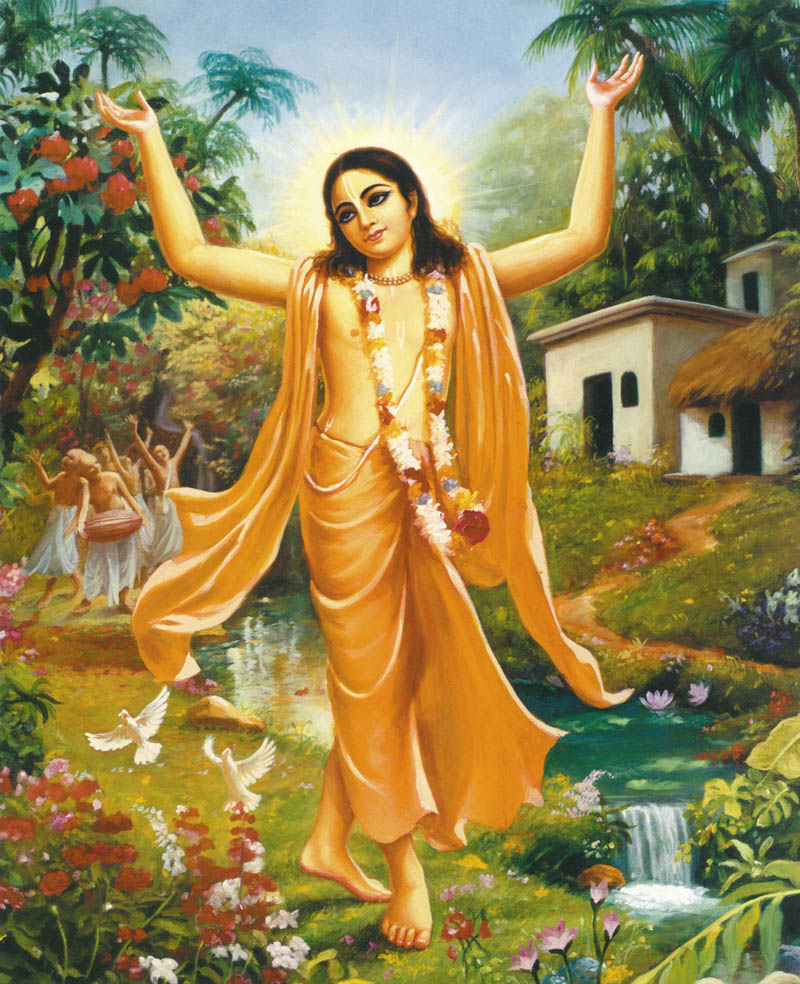 are meeting, and on other occasions not meeting. He sees Them in a great variety of pastimes. He is most often in rādhā-bhāva, sometimes in gopī-bhāva, and at times in mañjarī-bhāva. It is difficult to reveal these truths, and therefore Śrīla Kṛṣṇadāsa Kavirāja Gosvāmī has discussed them only in brief.
are meeting, and on other occasions not meeting. He sees Them in a great variety of pastimes. He is most often in rādhā-bhāva, sometimes in gopī-bhāva, and at times in mañjarī-bhāva. It is difficult to reveal these truths, and therefore Śrīla Kṛṣṇadāsa Kavirāja Gosvāmī has discussed them only in brief.
We have not heard about all these symptoms in Śrīmatī Rādhikā. However, if these are the symptoms of madanākhya-bhāva, they must be originally present in Śrīmatī Rādhikā. They have not been directly described, but they have been briefly mentioned in Śrī Haṁsadūta and similar books.
Śrīpāda Mādhava Mahārāja: Some hints are there.
Śrīla Bhaktivedānta Nārāyaṇa Mahārāja: Merely speaking about these topics will not suffice in our development of bhakti. It is essential to know and follow the principles of bhakti at its foundational stage. What is the beginning?
Śrīpāda Nemi Mahārāja: Ādau śraddhā tataḥ sādhu-saṅgo ’tha bhajanakriyā.
ādau śraddhā tataḥ sādhu-
saṅgo ’tha bhajana-kriyā
tato ’nartha-nivṛttiḥ syāt
tato niṣṭhā rucis tataḥ
athāsaktis tato bhāvas
tataḥ premābhyudañcati
sādhakānām ayaṁ premṇaḥ
prādurbhāve bhavet kramaḥ
(Bhakti-rasāmṛta-sindhu 1.4.15–16)
In the beginning there must be faith. Then one becomes interested in associating with pure devotees. Thereafter one is initiated by the spiritual master and executes the regulative principles under his orders. Thus one is freed from all unwanted habits and becomes firmly fixed in devotional service. Thereafter, one develops taste and attachment. This is the way of sādhana-bhakti, the execution of devotional service according to the regulative principles. Gradually emotions intensify, and finally there is an awakening of love. This is the gradual development of love of Godhead for the devotee interested in Kṛṣṇa consciousness.
Śrīla Bhaktivedānta Nārāyaṇa Mahārāja: What kind of śraddhā (faith)?
Śrīpāda Nemi Mahārāja: Pāramārthika-śraddhā (transcendental faith).
Śrīla Bhaktivedānta Nārāyaṇa Mahārāja: What is the meaning?
Śrīpāda Nemi Mahārāja: One endowed with transcendental faith considers, “Kṛṣṇa is the Supreme Personality of Godhead, and I have my relationship with Him through my Gurudeva.”
Śrīla Bhaktivedānta Nārāyaṇa Mahārāja: This is the definition of śraddhā:
‘śraddhā’-śabde — viśvāsa kahe sudṛḍha niścaya
kṛṣṇe bhakti kaile sarva-karma kṛta haya
(Śrī Caitanya-caritāmṛta, Madhya-līlā 22.62)
By rendering transcendental loving service to Śrī Kṛṣṇa, one automatically performs all subsidiary activities. This confident, firm faith, favourable to the discharge of devotional service, is called śraddhā.
What is the meaning?
Śrīpāda Nemi Mahārāja: This is the firm conviction that, “If I perform bhakti to Kṛṣṇa, all subsidiary activities are included.”
Śrīla Bhaktivedānta Nārāyaṇa Mahārāja: That is the secondary symptom of śraddhā, not the first. What is the first?
Śrīpāda Mādhava Mahārāja: Kṛṣṇa-sevā-vāsanā hi śraddhā ka mūla heih. The desire to serve Kṛṣṇa is the internal symptom of śraddhā, and the other is external.
Śrīpāda Giri Mahārāja: Śrīla Gurudeva, there are two internal reasons and two external reasons for Śrīman Mahāprabhu’s appearance. What are they?
Śrīla Bhaktivedānta Nārāyaṇa Mahārāja: There are two prominent and two secondary reasons. What are the two secondary reasons?
Śrīpāda Giri Mahārāja: One of the secondary reasons was to distribute rāga-mārga, the path of rāgānugā-bhakti. The other was to establish the yuga-dharma, the religious process for the age, which is the chanting of the holy name.
Śrīla Bhaktivedānta Nārāyaṇa Mahārāja: And what are the internal reasons?
Śrīpāda Giri Mahārāja: The primary internal reason was to fulfil Kṛṣṇa’s desires to taste the three moods of Śrīmatī Rādhikā, and the secondary internal reason was to answer the prayers of Advaita Ācārya.
Śrīla Bhaktivedānta Nārāyaṇa Mahārāja: (To all) Do you know the Nāgapatnīs? They prayed to Kṛṣṇa in this way:
kasyānubhāvo ’sya na deva vidmahe
tavāṅghri-reṇu-sparaśādhikāraḥ
yad-vāñchayā śrīr lalanācarat tapo
vihāya kāmān su-ciraṁ dhṛta-vratā
(Śrīmad-Bhāgavatam 10.16.36)
O Lord, we do not know how the serpent Kāliya has attained this great opportunity of being touched by the dust  of Your lotus feet. For this end, the goddess of fortune performed austerities for centuries, giving up all other desires and taking austere vows.
of Your lotus feet. For this end, the goddess of fortune performed austerities for centuries, giving up all other desires and taking austere vows.
What is the meaning of this verse?
Śrīpāda Padmanābha Mahārāja: The Nāgapatnīs were the wives of the serpent Kāliya.
Śrīla Bhaktivedānta Nārāyaṇa Mahārāja: How many wives did he have?
Śrīpāda Padmanābha Mahārāja: Our book does not say.
Śrīla Bhaktivedānta Nārāyaṇa Mahārāja: There were thousands, but one of them was prominent.
Śrīpāda Padmanābha Mahārāja: When Kṛṣṇa subdued Kāliya by dancing on Kāliya’s hoods, Kāliya lost all of his power and was dying. At that time the Nāgapatnīs approached Kṛṣṇa and began to pray.
Śrīla Bhaktivedānta Nārāyaṇa Mahārāja: Why did they not come to pray earlier? Why did they do so only in the end?
Prema-prayojana dāsa: At first Kāliya was fighting against Kṛṣṇa; he had no śaraṇāgati, no mood of surrender. Therefore his wives thought, “It is better if our husband dies because he is not a devotee.” However, when his head was trampled by Kṛṣṇa’s feet, he became somewhat humble. Seeing his humility, his wives considered, “Oh, perhaps he can be a devotee.” Then they prayed to Kṛṣṇa to be merciful to him.
Śrīla Bhaktivedānta Nārāyaṇa Mahārāja: Why did they pray to Kṛṣṇa?
Śrīpāda Nemi Mahārāja: They saw that he was now becoming a little devoted to Kṛṣṇa. For this reason they wanted Kṛṣṇa to be merciful.
Śrīla Bhaktivedānta Nārāyaṇa Mahārāja: Can you speak further?
Śrīpāda Padmanābha Mahārāja: They were thinking, “Maybe now he can become a pure Vaiṣṇava.” And they were Vaiṣṇavīs, so now they wanted to save him.
Śrīla Bhaktivedānta Nārāyaṇa Mahārāja: Why?
Śrīpāda Mādhava Mahārāja: The Nāgapatnīs first prayed to Kṛṣṇa that they preferred to become widows, but 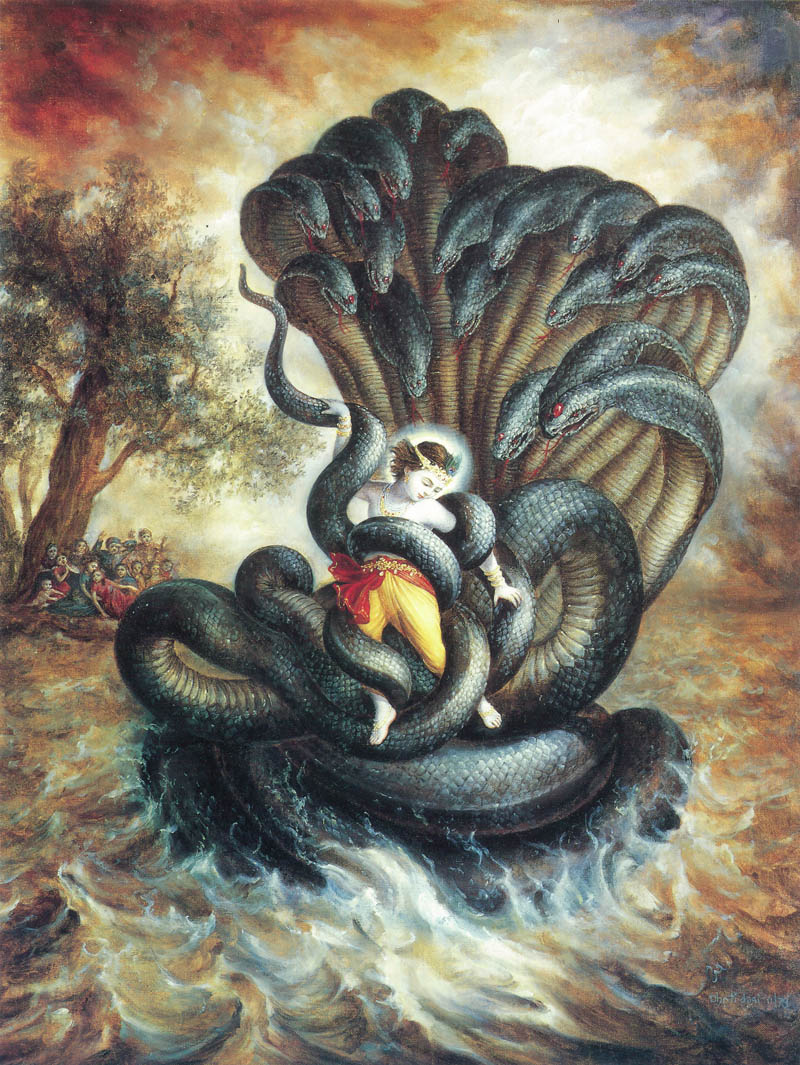 now that Kāliya was surrendering they began to think, “We are women, so we do not have much physical power. If our husband is not with us, another strong serpent may come and destroy our chastity. It is good that he has now surrendered to Kṛṣṇa. If he lives with us, our chastity will be protected and we can do bhajana together.”
now that Kāliya was surrendering they began to think, “We are women, so we do not have much physical power. If our husband is not with us, another strong serpent may come and destroy our chastity. It is good that he has now surrendered to Kṛṣṇa. If he lives with us, our chastity will be protected and we can do bhajana together.”
Śrīla Bhaktivedānta Nārāyaṇa Mahārāja: Do you all understand?
The Nāgapatnīs prayed, kasyānubhāvo ’sya na deva vidmahe. What is the meaning?
Śrīpāda Padmanābha Mahārāja: They did not understand how Kāliya could be so fortunate to have attained the foot-dust of Kṛṣṇa on his head; how he could have received such mercy from Kṛṣṇa that even Laksmī-devī could not obtain by her severe austerities. This serpent, in spite of being so sinful, somehow became fortunate. They wondered what kind of pious activities he had performed in previous lives in order to receive this benediction.
Śrīla Bhaktivedānta Nārāyaṇa Mahārāja: Can you say what austerities he performed in his past lives?
Śrīpāda Dāmodara Mahārāja: In the Purāṇas it is stated that Kāliya was a king in his previous life.
Śrīpāda Mādhava Mahārāja: And Śrīla Sanātana Gosvāmī also explains this in his Bṛhad-vaiṣṇava-toṣaṇī commentary.
Śrīpāda Dāmodara Mahārāja: Once, when there was no rain in his kingdom, that king asked the brāhmaṇas what he should do. They told him to worship a sādhu who was living underneath a particular tree. That sādhu had leprosy, but they did not disclose this to the king. They simply said, “Your sins will be destroyed by this process, and rain will come as well.”
Later the king saw that sādhu, and he brought some water to wash his feet. As the king washed the sādhu’s feet, and seeing that the sādhu had leprosy, he began to think, “I cannot drink this.” Hesitant to put the water in his mouth, he put it on his head instead. The sādhu remarked, “You are envious like a snake. Although you externally act like a very nice person, your heart contains so much poison. I therefore curse you to become a snake. However, because you put my caraṇāmṛta on your head, I bless you that the Supreme Lord will dance on your head.”
Śrīla Bhaktivedānta Nārāyaṇa Mahārāja: Do you know more details?
Śrīpāda Dāmodara Mahārāja: Kāliya received the mercy of Garuḍa. Garuḍa gave him mercy by touching him as they fought, and by indirectly giving him a place in Vṛndāvana.
Śrīla Bhaktivedānta Nārāyaṇa Mahārāja: This is not clear. It may be told more clearly. If one takes a Vaiṣṇava as one’s enemy, he will be blessed by the mercy of the enemy. The Vaiṣṇava is kind to all, merciful to all, without any cause.
Śrīpāda Mādhava Mahārāja: A Vaiṣṇava’s benediction and curse yield the same result.
Śrīla Bhaktivedānta Nārāyaṇa Mahārāja: Garuḍa is a topmost Vaiṣṇava.
If you befriend a sense enjoyer, a person who is attached to the opposite sex or one who opposes bhakti, the association of that ‘friend’ will cause you to go to hell. On the other hand, if your enemy is a pure Vaiṣṇava, this will bestow a result similar to that which occurred with Kāliya.
There is another important point in this connection. Kāliya was in Vṛndāvana (living on an island in the Yamunā) for a very long time – since the Satya-yuga of this manvantara’s fourth catur-yuga**, and Kṛṣṇa came to this world in this manvantara’s twenty-eighth catur-yuga. Kāliya remained there until Kṛṣṇa jumped into Yamunā’s water. It is stated in śāstra, “Dinam ekām nivāsena karau bhaktiḥ prajāyate – If anyone stays for even one night in Mathurā-maṇḍala, meaning Vraja-maṇḍala, he will attain bhakti” (Padma Purāṇa, Pātāla-khaṇḍa). Since Kāliya was living there for so many yugas, the effect would surely fructify.
One more thing to consider: How did Kāliya receive such mercy? Laksmī, Brahmā, and Śaṅkara desire that Śrī Kṛṣṇa place His lotus feet upon their heads, but they never attain the fruits of that desire. On the other hand, in spite of Pūtanā being inimical and wanting to kill Kṛṣṇa, He granted her the liberation of attaining a position as His nurse in Goloka; not in her present lifetime but in the next. Kāliya, however, attained Kṛṣṇa’s mercy in that very lifetime.
I have explained this narration about Kāliya, which is very deep so that you would know these truths.
Śrīpāda Mādhava Mahārāja: Śrīla Sanātana Gosvāmī explained another point as well. Kāliya left Vṛndāvana through the waterways, not the road. Why is that? He had so many wives and children. Serpents naturally look fearsome. Had Kāliya and his family used the road, everyone in the village would have been frightened.
Śrīla Bhaktivedānta Nārāyaṇa Mahārāja: Kāliya and his wives lived within Kāliya-daha, the lake of Kāliya. However, because snakes are not able to live in water, there must have been some land upon which they could reside. Therefore, in Kāliya-daha there must have been an island, and on that island there must have been some holes, or tunnels, in which Kāliya and his family used to live.
Because the island of Kāliya was situated in the middle of the lake, when Kṛṣṇa jumped into the lake, the water rose so high that it flooded Kāliya’s tunnel. Thus, greatly angered, Kāliya came out to fight with Kṛṣṇa, calling out, “Who is He?”
Śrīpāda Dāmodara Mahārāja: Gurudeva, why did Kṛṣṇa kill Pūtanā, Aghāsura, and Bakāsura in Vṛndāvana, but He sent Kāliya and all of his wives far away. It seems that this was not a very merciful act.
Śrīla Bhaktivedānta Nārāyaṇa Mahārāja: If Kāliya had remained in Vṛndāvana in his lake, even if the water was pure, all the Vrajavāsīs would have been frightened to go there; no one would have gone there to use the water. Also, because he looks very frightening with all his hoods, even though he had become a devotee; the Vrajavāsīs would fear him.
Moreover, Kṛṣṇa did not send him away as one would send another person into exile. Rather, He placed His footprints on Kāliya’s head, saying, “Garuḍa will not attack and eat you.” Kṛṣṇa gave him a visa stamp and passport.
Śrīpāda Padmanābha Mahārāja: You were saying that even if someone becomes the enemy of a Vaiṣṇava, 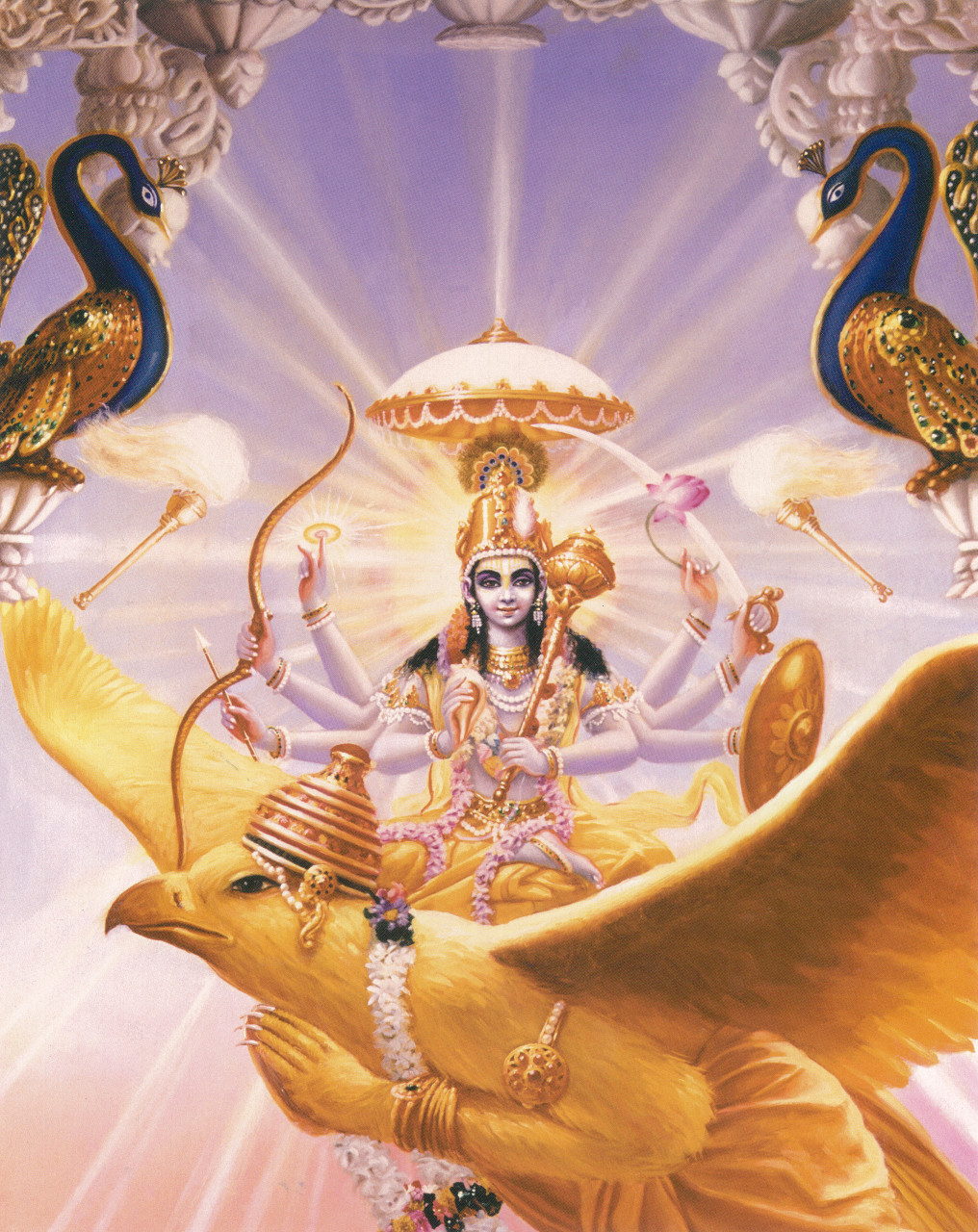 that Vaiṣṇava shows mercy towards him. But in śāstra…
that Vaiṣṇava shows mercy towards him. But in śāstra…
Śrīla Bhaktivedānta Nārāyaṇa Mahārāja: For example, Nārada Ṛṣi, a great Vaiṣṇava, a mahā-bhāgavata (topmost devotee), cursed Nalakūvera and Maṇigrīva. Eventually they realized that this was not a curse but a blessing. His so-called curse was actually his causeless mercy.
Similarly, Kāliya understood that he had received the causeless mercy of Kṛṣṇa and Garuḍa, and thus he prayed, “Now I realize that Garuḍa was not my enemy, even though I was inimical towards him. I have received the blessings of Your lotus feet on my head only due to his mercy.”
Śrīpāda Padmanābha Mahārāja: Śāstra states that it is very, very dangerous to commit an offence to a Vaiṣṇava, especially to a great Vaiṣṇava. In fact, śāstra explains that one’s creeper of devotion (bhakti-latā) may be destroyed by such an offence.
Śrīla Bhaktivedānta Nārāyaṇa Mahārāja: Yes, śāstra verifies this. On the other hand, although Kaṁsa showed extreme hostility towards Kṛṣṇa, in the end he was liberated, as were Pūtanā, Aghāsura, and Bakāsura.
If one knowingly commits offences to a mahā-bhāgavata, his bhakti-latā will be destroyed. However, those who commit offences in ignorance receive a lighter reaction. These demons never knew that they were committing offences, or what would be the consequent reactions.
Śrīpāda Mādhava Mahārāja: Kaṁsa was always absorbed in thinking about Kṛṣṇa and dreaming about Him.
Śrīla Bhaktivedānta Nārāyaṇa Mahārāja: Rāvaṇa was also like that. Rāvaṇa was not an offender. He was an associate of the Lord. He came to this world only to fulfil the Lord’s desire.
Śrīpāda Mādhava Mahārāja: He was always absorbed in thoughts of Rāma.
Śrīpāda Tridaṇḍī Mahārāja: But the Vaiṣṇava has no enemies.
Śrīla Bhaktivedānta Nārāyaṇa Mahārāja: He has no enemies. Yudhiṣṭhira Mahārāja used to address Duryodhana (meaning ‘evil warrior’) as Suyodhana (meaning ‘pure, well-behaved warrior’).
Śrīpāda Mādhava Mahārāja: And he used to address Duḥśāsana as Suḥśāsana.
Śrīla Bhaktivedānta Nārāyaṇa Mahārāja: Yudhiṣṭhira never regarded Duryodhana as his enemy. He used to say, “We are one-hundred and five brothers (the five Pāṇḍavas plus the one-hundred Kauravas headed by Duryodhana).” But Arjuna and Bhīma never thought like this. They wanted to kill Duryodhana and company.
Śrīpāda Padmanābha Mahārāja: Regarding Durvāsā Ṛṣi, the only way he could become free from his offence 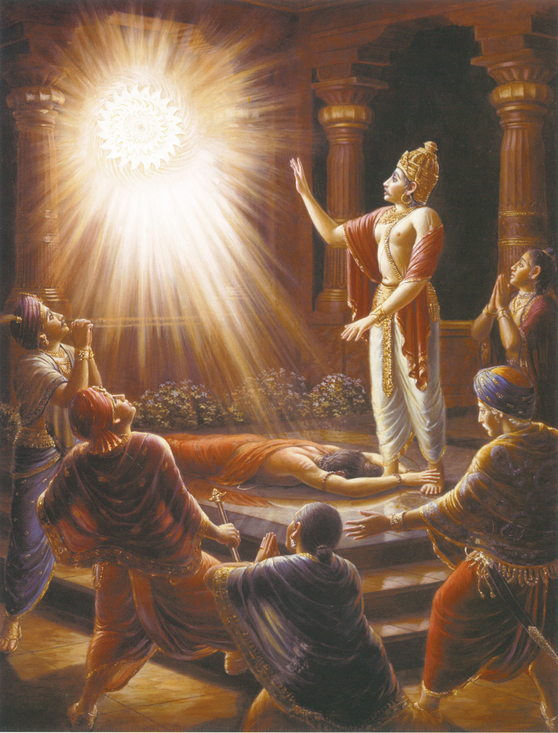 was to go directly to Ambarīṣa Mahārāja and beg forgiveness. So if someone commits a very heavy vaiṣṇava-aparādha, he must approach that Vaiṣṇava.
was to go directly to Ambarīṣa Mahārāja and beg forgiveness. So if someone commits a very heavy vaiṣṇava-aparādha, he must approach that Vaiṣṇava.
Śrīla Bhaktivedānta Nārāyaṇa Mahārāja: Durvāsā pretended to commit offences to Mahārāja Ambarīṣa. He is an incarnation of Śiva; Śiva cannot commit any offence. Durvāsā simply wanted to establish the glories of the pure devotee, Mahārāja Ambarīṣa, throughout the world.
Śrīpāda Padmanābha Mahārāja: But still, the principle is that if someone commits vaiṣṇava-aparādha, he will have to go and beg forgiveness, otherwise that person will be ruined.
Śrīla Bhaktivedānta Nārāyaṇa Mahārāja: In my village there was a Vaiṣṇava who would take a stick and begin to pursue anyone who would say, “Rāma Rāma.” Why did he do this? He considered, “Everyone will chant ‘Rāma Rāma’ to tease me, and then I will pursue them.” This was only a trick to enthuse everyone to chant the name of Rāma; he was not against Rāma.
It is my desire that all of our discussions during these morning walks should be noted in the form of a book. (To Śrīpāda Padmanābha Mahārāja) Have you done anything in this regard? If not, then you are not able to repay me.
(To all devotees present) I am telling you all; these morning walks must be published as a book, so that in the future everyone will be able to know all these truths. This is my idea.
Śrīpāda Mādhava Mahārāja: Like Perfect Questions, Perfect Answers.
* For more information on this pastime, please see Śrī Caitanya-caritāmṛta, Antya-līlā 17.15-28.]
** A catur-yuga is one millennium. A millennium lasts for the duration of a cycle of four yugas. In other words, the four yugas – Satya, Tretā, Dvāpara, and Kali – constitute one millennium. Each millennium, or catur-yuga, consists of over 4 million years. The Lord appears on schedule, namely at the end of the Dvāpara-yuga of the twenty-eighth millennium of the manvantara of the seventh Manu, called Vaivasvata Manu, in one day of Brahmā.
Source: Purebhakti.com
Image/Art made possible by Pixabay.com, Krishnapath.org and/or Bhaktiart.net
Unless indicated differently, all verse translations and quotes are from the books by Śrīla Bhaktivedānta Svāmī Mahārāja Prabhupāda (Vedabase.com)
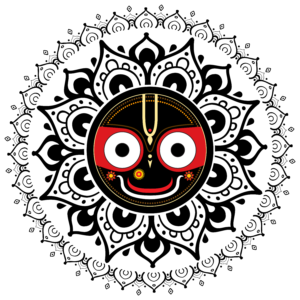
[ad_2]






